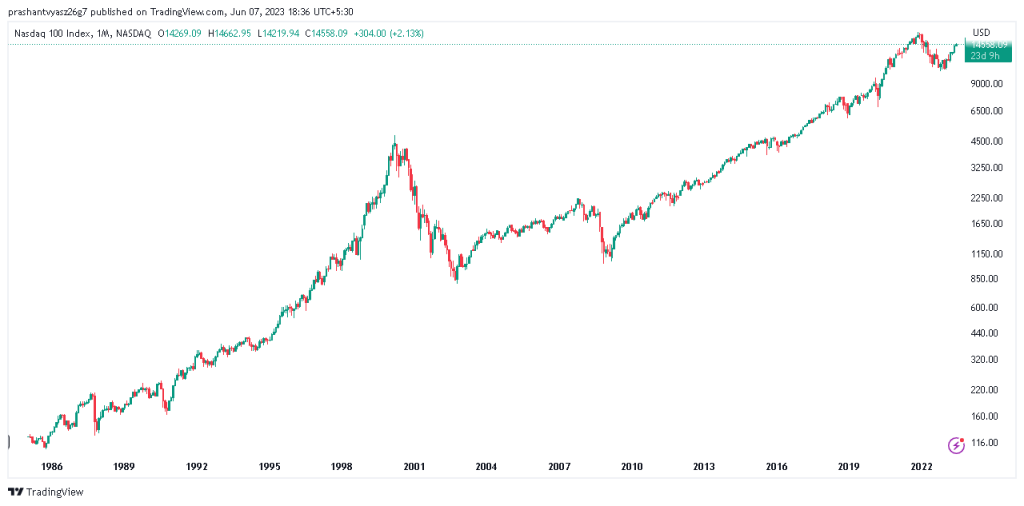| NASDAQ 100 | Cumulative Returns |
|---|---|
| YTD | + 35.27% |
| 1 Year | + 27.76% |
| Last 5 Years | + 92.64% |
| Last 10 Years | + 354.89% |
| Since Inception* | + 825.70% |
| Since Inception* | + 15,132% (Dividend Reinvested) |
| Biggest Gain | + 101.95% (1999) |
| Biggest Fall | – 41.89% (2008) |
| Average Annual Return | +15% to 17% |
The Nasdaq 100 index (NDX) is a technology-focused stock index that generated a 15% – 17% average return over the past 38 years, resulting in a cumulative return of over 15,44,2% including reinvestment of all cash distributions (Dividends). This means If you had invested $100 in January 1985, your portfolio would have grown to over $15,542 by the end of March 2023.
Nasdaq 100 Returns By Year [1986 to 2023]
| Year | Annual Return |
|---|---|
| 2023 | 35.27% (Till 22nd Sep. 2023) |
| 2022 | – 32.97% |
| 2021 | 26.63% |
| 2020 | 47.58% |
| 2019 | 37.96% |
| 2018 | – 1.04% |
| 2017 | 31.52% |
| 2016 | 5.89% |
| 2015 | 8.43% |
| 2014 | 17.94% |
| 2013 | 34.99% |
| 2012 | 16.82% |
| 2011 | 2.70% |
| 2010 | 19.22% |
| 2009 | 53.54% |
| 2008 | – 41.89% |
| 2007 | 18.67% |
| 2006 | 6.79% |
| 2005 | 1.49% |
| 2004 | 10.44% |
| 2003 | 49.12% |
| 2002 | – 37.58% |
| 2001 | – 32.65% |
| 2000 | – 36.84% |
| 1999 | 101.95% |
| 1998 | 85.30% |
| 1997 | 20.63% |
| 1996 | 42.54% |
| 1995 | 42.54% |
| 1994 | 1.50% |
| 1993 | 10.58% |
| 1992 | 8.86% |
| 1991 | 64.99% |
| 1990 | – 10.41% |
| 1989 | 26.17% |
| 1988 | 13.54% |
| 1987 | 10.50% |
| 1986 | 6.89% |
Nasdaq 100 vs S&P 500 Performance
The Nasdaq 100 Companies and S&P 500 are popular stock market indices used to measure the performance of the US stock market. However, they have some differences in their composition and focus.
Nasdaq has the 100 largest non-financial companies on Nasdaq, focused on tech and the internet. Apple, Amazon, Microsoft, and Facebook are in the index and it generates a 15-17% average annual return.
While S&P 500 has five hundred large-cap US companies across various sectors. Apple, Microsoft, Berkshire Hathaway, and Johnson & Johnson are in the index and it generates a 10-11% average annual return.
While both indexes can serve as a good starting point for investment, it’s essential to remember that past performance doesn’t necessarily predict future results, and their performance can be influenced by a range of factors.
Also, Checkout – Dow Jones Annual Returns
Is Nasdaq 100 A Good Investment?
Well, from a return point of view, the short answer is Yes.
Because if you just go with the price starting at $125 in January 1985, the price of the index is now close to $17,394.3, representing an increase of more than 100x (times) in the past 38 years (Without Dividend Reinvested). It’s important to note that we are not talking about any single stock, this is the tech index.
However as an investment purpose, it depends on an individual’s financial goals, risk tolerance, and investment timeline. The Nasdaq 100 may offer the potential for higher returns but also comes with higher volatility compared to more traditional investment options.
How to Invest In Nasdaq 100?
Investing in an index fund is one of the best strategies for investors as the majority of mutual funds fail to generate higher returns than the benchmark index.
The Nasdaq-100 has more than 55% weight in the Technology Sector and 20.8% weight in the Consumer Discretionary Section. Therefore it is a good option for those investors who want to aggressively invest in tech sectors or MAANG stocks (Meta, Apple, Amazon, Netflix, and Google).
The best way to invest in Nasdaq 100 Index (NDX) is to buy Nasdaq-100 ETFs or Index funds, which allow you to invest in entire 100 companies according to their weight in just one click.
Here are the top ETFs for the Nasdaq 100 Index:
1. Invesco QQQ Trust
2. Invesco NASDAQ 100 ETF
3. USAA NASDAQ-100
4. Innovator Nasdaq-100
5. Invesco Nasdaq 100 Index Fund
Thank You For Reading: If you have any queries regarding this feel free to ask in the comment box.
Disclaimer ✋
The information included on this site is for educational purposes and is not intended as a substitute for investment advice. Data on past performance, where given, is not necessarily a guide to future performance. So before investing, you should carefully consider the Fund’s investment objectives, risks, charges, and expenses.

0 Comments